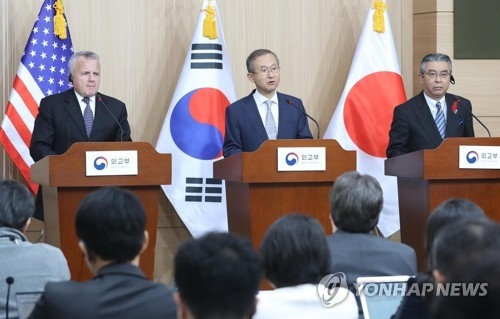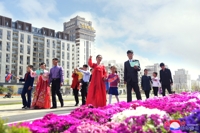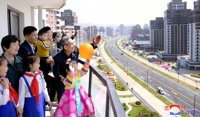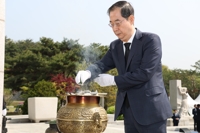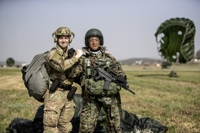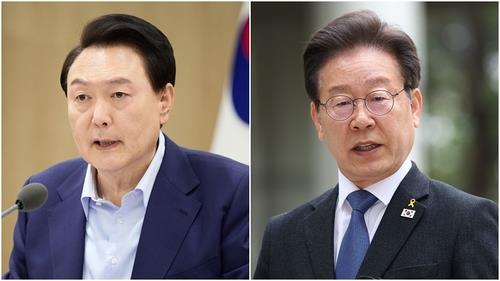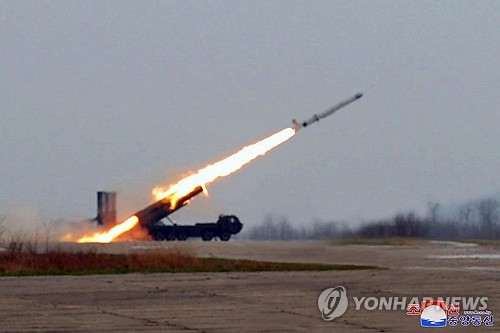(4th LD) S. Korea, U.S., Japan agree to seek all possible diplomatic options on N.K.
(ATTN: ADDS comments on comfort women in last 4 paras)
SEOUL, Oct. 18 (Yonhap) -- Senior diplomats from South Korea, the United States and Japan agreed Wednesday to seek all possible diplomatic options for peacefully and completely resolving the issue of North Korea's nuclear program.
South Korea's Vice Foreign Minister Lim Sung-nam hosted trilateral talks in Seoul with U.S. Deputy Secretary of State John Sullivan and Japanese Vice Foreign Minister Shinsuke Sugiyama.
"We shared our assessments of the current situation and reaffirmed our push for a complete dismantlement of the North's nuclear program through peaceful methods," Lim told reporters in a joint press conference. "We also agreed to make all possible diplomatic efforts, including sanctions and dialogue, through close coordination among the three countries."
"In particular, the three countries held the same view that it is essential to stably manage the situation on the Korean Peninsula, while at the same time keeping pressure on the North to resolve its nuclear problem," he added.
Sullivan echoed Lim's comments, emphasizing that the U.S. is "dedicated" to diplomacy in resolving the North's nuclear issue and that its aim is to eventually bring the North to the negotiating table.
"We are dedicated to diplomacy. We are dedicated to the campaign of pressure on the DPRK, pressure not only by our allies but by other states as well, including China, Russia and other members of the U.N. Security Council," he said.
"Our objective is, through the campaign of pressure, to bring North Korea to the negotiating table without preconditions so that we can achieve our objective of a denuclearized Korean Peninsula," he noted.
Sullivan said that the U.S. will continue its efforts to press the North to give up its nuclear weapons development aspirations but it should be prepared to respond to any circumstances given that the North is "unpredictable" and "not transparent."
"We will continue those efforts to press the regime to stop its unlawful behavior, stop the weapons tests, stop the missile tests. We are working to denuclearize the Korean Peninsula... however, the regime in Pyongyang is unpredictable and not transparent," he said.
"We have to be prepared. For that reason, President Trump, Secretary Mattis and Secretary Tillerson said that all options are on the table. Diplomacy is our primary objective... in addressing the threats posed by North Korea. (But) we are prepared to respond to any eventuality," he added.
The trilateral meeting comes amid tensions prompted by North Korea's sixth nuclear test last month and bellicose rhetoric exchanged between the leaders of the North and the U.S., both of whom suggested possible military action against each other.
Lim said that the North is not showing any intention to resume talks on its nuclear and missile programs. He stressed the need to keep applying pressure on the reclusive state and induce its regime to change its strategic calculus and be assured that there is a "bright future" waiting for it should it take the path.
"We have to send a consistent message and I believe that message is being sent out," Lim said.
Sugiyama said that it is more important than ever to maintain close three-way cooperation with South Korea and Japan in addressing the North's nuclear issue.
"We also agreed to intensify our cooperative relationship in case tensions escalate further," he said.
Meanwhile, South Korea and Japan reconfirmed their marked differences on how to interpret a controversial deal reached between the two neighbors in late 2015 to resolve the issue of Japan's wartime sexual slavery of Korean women.
The Moon Jae-in government, which took office in May, has said that the deal is not enough to reflect the overall public sentiment about the atrocity committed by Japanese troops during World War II and launched a task force to review the procedure by which it was reached and other relevant details.
"We clearly deliver our government's stance that what was agreed upon with South Korea with regard to the comfort women issue should be faithfully enforced," Sugiyama said.
Historians estimate that up to 200,000 women, mainly from Korea, which was a Japanese colony from 1910 to 1945, were forced to work in front-line brothels for Japanese soldiers during World War II. Japan has long attempted to whitewash the atrocity.
kokobj@yna.co.kr
(END)
-
 Overdue debut of Korean abstract art pioneer Yoo Young-kuk at Venice Biennale
Overdue debut of Korean abstract art pioneer Yoo Young-kuk at Venice Biennale -
 Defense chief says N. Korea's hypersonic missile 'unsuccessful' in last-stage glide flight
Defense chief says N. Korea's hypersonic missile 'unsuccessful' in last-stage glide flight -
 Relax, immerse yourself in scents at Venice Biennale's Korean Pavilion
Relax, immerse yourself in scents at Venice Biennale's Korean Pavilion -
 N. Korea has capability to genetically engineer biological military products: U.S. report
N. Korea has capability to genetically engineer biological military products: U.S. report -
 S. Korea marks 30th anniv. of Korean Pavilion at Venice Biennale with contemporary art
S. Korea marks 30th anniv. of Korean Pavilion at Venice Biennale with contemporary art
-
 Overdue debut of Korean abstract art pioneer Yoo Young-kuk at Venice Biennale
Overdue debut of Korean abstract art pioneer Yoo Young-kuk at Venice Biennale -
 Relax, immerse yourself in scents at Venice Biennale's Korean Pavilion
Relax, immerse yourself in scents at Venice Biennale's Korean Pavilion -
 Artist Lee Bae captures ethereal Korean aesthetics at Venice Biennale
Artist Lee Bae captures ethereal Korean aesthetics at Venice Biennale -
 S. Korea marks 30th anniv. of Korean Pavilion at Venice Biennale with contemporary art
S. Korea marks 30th anniv. of Korean Pavilion at Venice Biennale with contemporary art -
 Defense chief says N. Korea's hypersonic missile 'unsuccessful' in last-stage glide flight
Defense chief says N. Korea's hypersonic missile 'unsuccessful' in last-stage glide flight
-
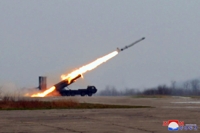 N. Korea says it conducted 'super-large warhead' test for strategic cruise missile
N. Korea says it conducted 'super-large warhead' test for strategic cruise missile -
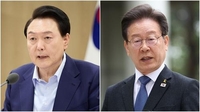 (LEAD) Yoon proposes first-ever meeting with opposition leader
(LEAD) Yoon proposes first-ever meeting with opposition leader -
 (2nd LD) N. Korea says it conducted 'super-large warhead' test for strategic cruise missile
(2nd LD) N. Korea says it conducted 'super-large warhead' test for strategic cruise missile -
 Gov't likely to accept university chiefs' request to lower med school enrollment quota
Gov't likely to accept university chiefs' request to lower med school enrollment quota -
(URGENT) N. Korea conducted 'super-large warhead' test for strategic cruise missile: KCNA
